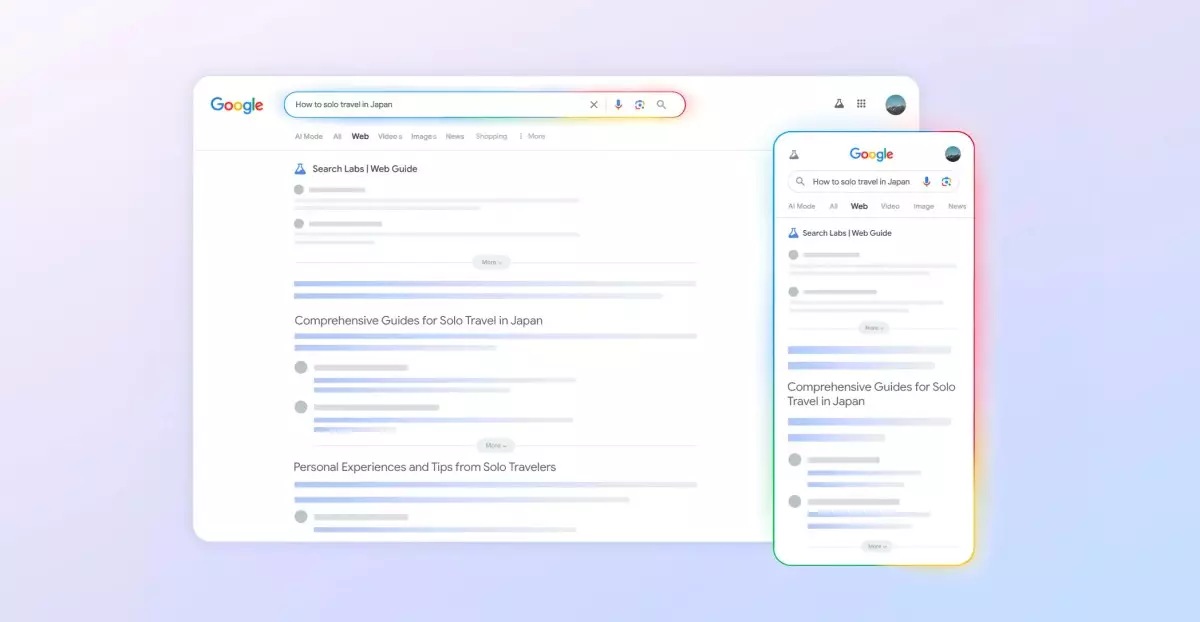Google’s latest innovation, Web Guide, represents a bold leap toward integrating artificial intelligence into everyday search experiences. By leveraging a custom version of the Gemini AI model, this tool endeavors to transform the traditional search engine results page (SERP) into a more intuitive and organized hub of information. Instead of the familiar list of “10 blue links,” Web Guide provides categorized clusters of relevant content, summaries, and related questions, aiming to streamline our quest for knowledge. The promise here is clear: reduce the noise, highlight the most pertinent information, and make complex searches more manageable.
However, while its aspirational goals are commendable, there is a stark need for critique. AI, no matter how sophisticated, remains prone to misinterpretation and bias. The reliance on generative AI to organize and summarize complex topics like horticulture or social connectivity introduces a risk of echoing inaccuracies present in training data. The inclusion of links from reputable sources such as universities and community forums offers some credibility, yet the superficial summaries and categorization can sometimes oversimplify or distort nuances, leaving users with a condensed version that lacks depth.
Balancing Traditional Results with AI Assistance
What stands out positively about Web Guide is its attempt to preserve the familiar structure of search results—highlighting links at the top before delving into AI-generated overviews. This hybrid approach offers a compromise between the traditional and the innovative, giving users a choice to delve deeper or trust the AI’s synthesis. For instance, when researching mango tree care, the dual display of relevant documents alongside AI summaries can be quite helpful, especially for quick reference or initial exploration.
Yet, the execution reveals limitations. The AI-generated categories often include verbose or redundant descriptions such as “The most effective way to care for a mango tree varies slightly depending on its age, location, and specific cultivar.” While informative, it borders on stating the obvious—information that many seasoned users can already infer or easily verify. Such comments, while seemingly helpful, risk cluttering the interface and perhaps even diluting the perceived value of the AI’s summaries.
Critically, the experience feels like a step towards “more,” but not necessarily “better.” The added categories may help some users navigate large datasets quickly, yet for others, this might lead to over-curation, where the searcher is nudged away from independent exploration and into a more passive consumption of AI summaries and categorized links.
The Broader Implications and Challenges of AI Integration
Google’s partnership with content creators, exemplified by its $60 million deal with Reddit, underscores the vital importance of training data in shaping AI outputs. While leveraging community-generated content enriches the AI’s knowledge base, it further complicates issues around content accuracy, bias, and moderation. As Web Guide pulls information from platforms with varying credibility, the risk of propagating misinformation—whether intentional or accidental—increases.
Moreover, the user experience isn’t immune to critique. Although the goal is to declutter and organize, the added AI descriptions can sometimes clutter the interface, making the results appear overly busy or redundant. The potential for over-reliance on AI summaries may inadvertently discourage users from engaging directly with original sources, impeding deep learning and critical thinking.
There’s also the matter of transparency: As users navigate AI-powered categories, they need clarity about what is generated versus what is sourced directly. Without clear demarcation, the impression might be that AI summaries are authoritative, which is a misconception. Ensuring users understand the limitations and potential biases of AI-generated content remains a crucial challenge that Google must address as it pushes forward with these innovations.
A Future of Potential or Peril?
In essence, Web Guide embodies an ambitious vision: a next-generation search experience that combines the best of human-curated links and AI-driven insights. Its capacity to synthesize large volumes of data and present them in digestible formats could significantly enhance our ability to find precise information quickly. But this potential is double-edged; it hinges on the quality of AI training, the transparency of its processes, and the willingness of users to remain critical consumers of this technology.
While Google’s move towards AI-enhanced search sets a compelling precedent, it also raises fundamental questions about the future of information discovery. Will AI truly complement human curiosity or subtly diminish our capacity to explore, question, and verify? As critics, we must remain vigilant, ensuring that innovations like Web Guide serve as tools for empowerment rather than shortcuts that foster complacency. The path forward demands not only technological advancement but also a cautious judgment that keeps the integrity of information at the forefront.

